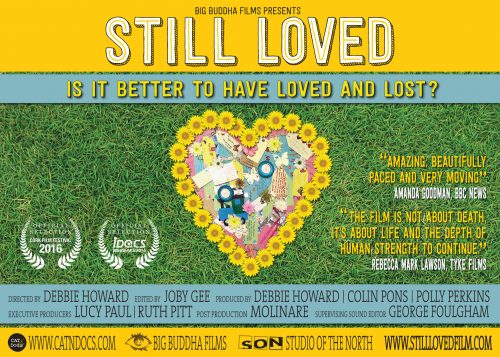
Guest post by Debbie Howard – Director/Producer – Big Buddha Films
During the making of my previous short film Peekaboo, I had already built up close relationships with many families who had lost babies, so I had their trust from the beginning of this documentary and was able to gain remarkable access to their personal lives. I had become passionate about telling these parents’ stories over the past six years, as I had discovered how much of a taboo talking about stillbirth is and how this impedes the healing of the families involved. I had met courageous, humorous and generous people and desperately wanted to share their stories with others.
Over 3,500 babies are stillborn in the UK every year – shockingly, the highest stillbirth rate for any country in Europe. Approximately 15 babies a day are stillborn in the UK. Only 10% of stillbirths happen because of a genetic problem that meant the baby had no chance of surviving. The reality is that with more awareness and more research, thousands of babies’ lives across the UK could be saved. Taking ten times more lives than cot death, stillbirth is more than a personal tragedy, it is a public health crisis. Urgent advances are needed to understand and raise awareness of the causes of stillbirth and how it can be prevented.
“…This is one of the most neglected, marginalised, stigmatised issues in global health today. We simply don’t talk about stillbirths.”
Richard Horton, Editor in Chief, The Lancet
People need to understand that it’s not abstract when a baby dies. It’s someone’s child that has died. Saying things like ‘never mind you can have another’ aren’t helpful, in exactly the same way that we wouldn’t say that to someone who lost a ten year old child. We need to be able to feel comfortable to talk about their babies, to say their name. I hope this film will bring much more understanding around what happens in a family when their baby dies.
In Still Loved we focus mainly on three families’ distinct and unique stories, supported by other families to punctuate and enhance the three main narratives. These are cleverly woven together into one story arc, telling a common story with different voices. This helps to illustrate the frequency of baby loss and how it affects so many more people than just the parents, including siblings, extended family and friends.
We look closely at the role of the fathers. Dads often feel marginalized when a baby dies, most of the focus being on the mother. In Still Loved the dads express their feelings about losing their baby and about the way our culture and society expects men to handle this, not really giving them a place or time to grieve. We are passionate about giving the fathers a voice in this film and they relish the opportunity to speak candidly about how they really feel.
The challenge I face is to engage audiences to watch a film about such a difficult subject matter and for this film to have further reach than those that have lost a baby themselves. In order to tackle this, I chose stories that offer hope, love, resilience and courage. Ultimately it’s a human story uncovering the incredible ability to triumph over adversity. The participants are very candid about their feelings, and although heartbreaking in places, we use humor to offer relief and create light and shade throughout the film.
Watch the trailer for Still Loved here: https://vimeo.com/145618118
We are about to release Still Loved into cinemas during October, for International Pregnancy and Infant Loss Awareness month. This has been extremely difficult due to the subject matter being too much for people. A lot of programmers simply wouldn’t watch it, or just told us “There is no interest in this subject.” This was challenging, being that they are the Gatekeepers, a big wall between our audience and the film itself. Only a handful of cinemas came on board to screen the film, so the rest of the screenings we have booked through Ourscreen. The cinema books you in and you have to pre sell a lot of tickets through your own networks two weeks before the screening or it’s cancelled. This is incredibly difficult, because very few people book cinema tickets weeks in advance and no press will cover the event until it’s confirmed.
We have been doing a huge amount of promotion and publicity ourselves, with the support of Tommy’s and Sands. But we want to reach a wider audience. It’s no use preaching to the converted. Those that have lost babies know exactly what happens when a baby dies. We want the film to reach those that don’t know. It’s an incredibly valuable film for midwives and health care professionals, but also for anyone supporting someone through a loss. Ultimately it’s a film for anyone who has ever, or will ever lose someone they love.
“The subject matter of Still Loved is emotionally challenging, it should be, this is not a film to make the viewer feel comfortable. To make progress, we must break the silence, the stigma and the taboo that surrounds the death of a baby, Still Loved begins this process it provides an accessible, original and profound insight into the effects of the death of a baby.”
Alexandra Heazell, Senior Clinical Lecturer in Obstetrics and Clinical Director of the Tommy’s Maternal and Fetal Health Research Centre
If you would like to see a screening of Still Loved please see the screening list on our website and follow the instructions on how to book:
http://www.stilllovedfilm.com/screenings.html
To find out more about the film visit www.stilllovedfilm.com

